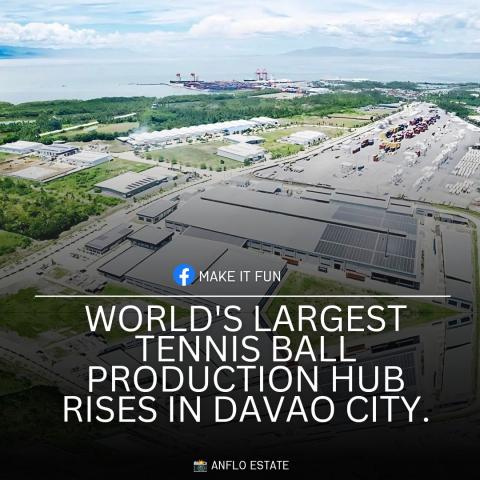
An Ace for Philippine Tennis: HEAD's Game-Changing Factory to Serve Up Affordable, World-Class Gear in Davao. For decades, the familiar thwock of a fresh tennis ball has come with a steep price tag for Filipino players. We’ve grown accustomed to budgeting not just for court fees and rackets, but for the essential, yet imported, cans of balls that are the lifeblood of our practice and play. That financial burden, a silent opponent for many aspiring talents and weekend warriors alike, is about to be hit for a winner.
In a move that signals a seismic shift for the sport in the Philippines and the global supply chain, HEAD Penn, the Austrian sporting giant responsible for approximately 40% of the world's tennis ball production, is establishing a monumental new manufacturing facility right here in Davao, Mindanao.
This isn't just a small-scale operation. According to the initial reports and confirmed by the Austrian Federal Economic Chamber, the plant at the Anflo Industrial Estate (AIE) in Panabo is poised to become the largest tennis ball factory on the planet. Its initial phase will produce a staggering 2 million dozen (24 million individual) balls annually, with ambitious plans to scale up to an almost unimaginable 14 million dozen.
For a tennis writer who has chronicled the struggles of local players for two decades, this is more than an industrial headline—it's a potential revolution.
Why Davao? The Strategic Smarts Behind the Location
The choice of the Anflo Industrial Estate is a masterstroke in logistics. Spanning 63 hectares near the Davao International Container Terminal, AIE is a modern industrial hub renowned for its state-of-the-art infrastructure and robust logistics network.
Analysis: This location is key. The proximity to a major international port drastically reduces shipping times and costs for the raw materials (like premium-grade rubber and felt) coming in and, crucially, for the finished products going out to markets across Asia and beyond. For HEAD, it's a strategic play to dominate the Asian market more efficiently. For the Philippines, it's an injection of high-value manufacturing and a statement that Mindanao is open for world-class business.
The Direct Impact: Lower Costs, Higher Quality, More Play
The most immediate and exhilarating benefit for the local tennis community is economic. Tennis balls, entirely imported until now, carry significant import duties, shipping fees, and multiple layers of distributor markups. A can of three premium balls can easily cost a player anywhere from ₱500 to ₱800.
Expert Analysis: "The local production of HEAD tennis balls will fundamentally alter the economics of the sport here," says Miguel Santos, a former Davis Cup player and now a national coach. "When you remove those importation costs, the savings are passed on. We could be looking at a reduction of 30% or even 40% in retail price. This means clubs can afford to use fresh balls more often. Juniors can practice with quality equipment without it being a financial strain on their families. It raises the standard of play across the board because the tool we use most frequently becomes more accessible."
Furthermore, playing with consistent, high-quality balls is non-negotiable for proper development. worn-out, low-pressure balls are a poor training tool. With a local HEAD factory, the assurance of fresh, tournament-quality balls being readily available and affordable will elevate the quality of training from the grassroots to the national team level.
Beyond the Balls: A Catalyst for Philippine Tennis
The ripple effects of this investment extend far beyond the price tag on a can of balls.
- Jobs and Economy: The factory will create hundreds, if not thousands, of direct and indirect jobs, boosting the local economy in Davao and showcasing skilled manufacturing in the region.
- HEAD's Presence: Where the factory goes, the brand follows. This significant investment greatly increases the likelihood of HEAD expanding its footprint in the Philippines through sponsorships for national players, support for local tournaments, and equipment grants for development programs. Their presence could become a powerful patron for Philippine tennis.
- Pride and Potential: There’s an intangible boost in knowing that the balls used at Wimbledon, the Australian Open, and by professionals worldwide are also made on Philippine soil. It connects our tennis community directly to the sport's highest level.
A Word of Caution and Optimism
The excitement is palpable, but a veteran observer knows the match isn't won until the last point is played. The success of this venture for local players hinges on HEAD and its local distributors implementing a clear and committed strategy for the domestic market. The goal must be to ensure that a significant portion of the production benefits Filipino players directly at a truly localized price, not just be exported for profit.
This is a once-in-a-generation opportunity for Philippine tennis. The establishment of HEAD's global flagship factory in Davao is a powerful serve that has landed right in the sweet spot. It’s now up to the entire tennis ecosystem—from the national association to local clubs—to get to the net and put away the volley.
The future of Philippine tennis just got a whole lot brighter, and it sounds like the perfect pop of a brand-new, made-in-Mindanao HEAD tennis ball.
